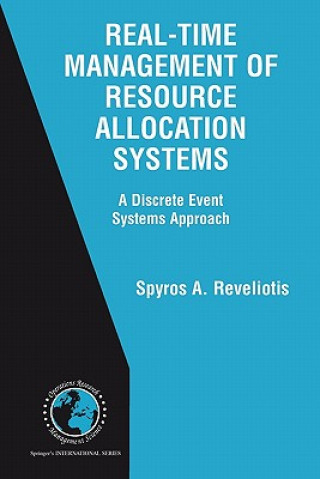
Delivery
Shopping guide





Doesn't suit? No problem! You can return within 30 days
 Gift voucher
any value
Gift voucher
any value
You won't go wrong with a gift voucher. The gift recipient can choose anything from our offer.
Real-Time Management of Resource Allocation Systems
 English
English
 331 b
331 b
30-day return policy
You might also be interested in


REAL-TIME MANAGEMENT OF RESOURCE ALLOCATION SYSTEMS focuses on the problem of managing the resource allocation taking place within the operational context of many contemporary technological applications, including flexibly automated production systems, automated railway and/or monorail transportation systems, electronic workflow management systems, and business transaction supporting systems. A distinct trait of all these applications is that they limit the role of the human element to remote high-level supervision, while placing the burden of the real-time monitoring and coordination of the ongoing activity upon a computerized control system. Hence, any applicable control paradigm must address not only the issues of throughput maximization, work-in-process inventory reduction, and delay and cost minimization, that have been the typical concerns for past studies on resource allocation, but it must also guarantee the operational correctness and the behavioral consistency of the underlying automated system. The resulting problem is rather novel for the developers of these systems, since, in the past, many of its facets were left to the jurisdiction of the present human intelligence. It is also complex, due to the high levels of choice otherwise known as flexibility inherent in the operation of these environments.§This book proposes a control paradigm that offers a comprehensive and integrated solution to, both, the behavioral / logical and the performance-oriented control problems underlying the management of the resource allocation taking place in the aforementioned highly automated technological applications. Building upon a series of fairly recent results from Discrete Event Systems theory, the proposed paradigm is distinguished by: (i) its robustness to the experienced stochasticities and operational contingencies; (ii) its scalability to the large-scale nature of the target technological applications; and (iii) its operational efficiency. These three properties are supported through the adoption of a "closed-loop" structure for the proposed control scheme, and also, through a pertinent decomposition of the overall control function to a logical and a performance-oriented controller for the underlying resource allocation. REAL-TIME MANAGEMENT OF RESOURCE ALLOCATION SYSTEMS provides a rigorous study of the control problems addressed by each of these two controllers, and of their integration to a unified control function. A notion of optimal control is formulated for each of these problems, but it turns out that the corresponding optimal policies are computationally intractable. Hence, a large part of the book is devoted to the development of effective and computationally efficient approximations for these optimal control policies, especially for those that correspond to the more novel logical control problem.Real-Time Management of Resource Allocation Systems focuses on the problem of managing the resource allocation taking place within the operational context of many contemporary technological applications, including flexibly automated production systems, automated railway and/or monorail transportation systems, electronic workflow management systems, and business transaction supporting systems. A distinct trait of all these applications is that they limit the role of the human element to remote high-level supervision, while placing the burden of the real-time monitoring and coordination of the ongoing activity upon a computerized control system. Hence, any applicable control paradigm must address not only the issues of throughput maximization, work-in-process inventory reduction, and delay and cost minimization, that have been the typical concerns for past studies on resource allocation, but it must also guarantee the operational correctness and the behavioral consistency of the underlying automated system. The resulting problem is rather novel for the developers of these systems, since, in the past, many of its facets were left to the jurisdiction of the present human intelligence. It is also complex, due to the high levels of choice otherwise known as flexibility inherent in the operation of these environments.
About the book
 English
English




 How to shop
How to shop



































